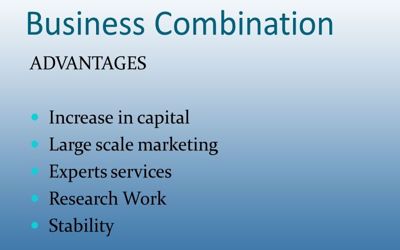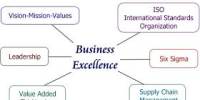Advantages of Business Combination
A business combination is a transaction in which an acquirer gains control over a business. To determine if a business combination has happened, an acquirer must first evaluate whether it has acquired a business or a group of assets. The advantages of a combination are controversial because the creation of monopoly and elimination of competition both are considered the merits and demerits of the combination. The distinction is critical because the accounting treatment is very different based on the determination.
The main objective of the business combination is to eliminate cut-throat competition and secure the advantages of large scale production.
Following are the advantages of the business combination.

(1) Competition between and among the companies will be eliminated. Costs incurred for advertisement and sales promotion by different small firms can be saved if they combine together.
(2) Amount of capital can be increased by combining business. They derive advantages through bulk purchase of raw materials, and economies in production, marketing, finance, etc.
(3) Establishment and management costs can be reduced. Firms combining together can pool their knowledge and experience. All the firms in the combination can benefit from a vast pool of such shared knowledge.
(4) Benefits of large scale production can be secured. Patents possessed by one of the firms can be used by all the combined firms and products can be produced on a larger scale.
(5) Operating costs can be reduced by avoiding duplication. The resources can be used to acquire the latest technology, employ experienced and qualified talent, and adopt the best practices in the business.
(6) Research and development facilities are increased. If firms combine together, they can explore new markets, tap new consumer segments, engage in research, and develop new products. This results in increased sales and profits.
(7) Monopoly in the market can be achieved. A combined firm can control the market in terms of pricing, level of supplies, and sometimes may even enjoy monopoly power.
(8) Bulk purchase of materials at a reduced price is possible. Firms can plan their production according to market requirements. The risk of overproduction can be reduced to a great extent.
(9) Stability of the price of goods is maintained. Common problems faced by firms can be tackled easily if they come together. They can represent their demands to the government in a unified manner.
(10) A combined firm would be able to provide a better quality of customer service, open more branches, and produce different products to meet customer requirements.
















